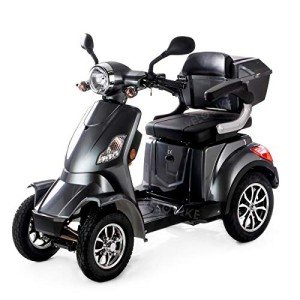Mobility Scooters in the UK: A Comprehensive Guide
In the United Kingdom, mobility scooters are becoming an increasingly popular means of transport for individuals with mobility problems, supplying them with the flexibility to navigate their neighborhoods separately. These motorized lorries are developed to assist those who have problem walking or using a manual wheelchair, using a useful and comfy solution for day-to-day travel. This article explores the world of mobility scooters in the UK, exploring their benefits, legal requirements, and how to choose the best rated mobility scooter one.

Introduction to Mobility Scooters
A mobility scooter is a battery-powered vehicle that normally has three or 4 wheels, a seat for the motorist, and handlebars for guiding. They are developed to be easy to use and preserve, making them perfect for older grownups and people with impairments who desire to preserve their self-reliance. Mobility scooters come in numerous sizes and designs, each accommodating various requirements and choices.
Benefits of Mobility Scooters
- Increased Independence: Mobility scooters allow users to take a trip longer ranges without the physical strain related to strolling or using a manual wheelchair. This self-reliance can considerably improve their lifestyle.
- Cost-efficient: Compared to other motorized lorries, mobility scooters are reasonably cost effective. They likewise require minimal upkeep, which can save users a great deal of cash in the long run.
- Alleviate of Use: Most mobility scooters are designed to be user-friendly, with user-friendly controls and comfy seating. They are frequently lightweight and can be easily taken apart for transportation.
- Enhanced Social Interaction: By enabling users to venture out more frequently, mobility scooters can help lower sensations of seclusion and isolation, cultivating social connections and community participation.
- Enhanced Safety: Mobility scooters are geared up with functions such as headlights, brake lights, and horns, making them more secure for usage on roadways and in public spaces.
Types of Mobility Scooters
When selecting a mobility scooter, it's essential to consider the type that best suits your requirements. Here are the main types readily available in the UK:
Class 2 Mobility Scooters:
- Speed: Limited to 4 mph (6.4 km/h)
- Usage: Suitable for pavements and pedestrian areas
- Functions: Compact and light-weight, collapsible for simple transport
Class 3 cheap mobility scooters near me Scooters:
- Speed: Can rise to 8 miles per hour (12.9 km/h)
- Usage: Suitable for both pavements and roads, supplied they are registered and guaranteed
- Functions: Sturdier construct, often with more advanced features like suspension and larger batteries
Heavy Duty Mobility Scooters:
- Capacity: Designed to support users weighing as much as 400 pounds (181 kg)
- Usage: Ideal for those who require a robust and durable scooter
- Features: Reinforced frame, broader seat, and boosted stability
Off-Road Mobility Scooters:
- Terrain: Built to manage rough and uneven surface areas
- Use: Suitable for users who enjoy outside activities like hiking or fishing
- Features: All-terrain tires, high ground clearance, and effective motors
Legal Requirements for Mobility Scooters in the UK
Utilizing a mobility scooter in the UK includes certain legal responsibilities. Here are the essential points to consider:
- Registration and Insurance:
- Class 2 Scooters: No registration or insurance needed
- Class 3 Scooters: Must be registered with the DVLA, insured, and show a legitimate MOT certificate if used on roadways
- Motorist Requirements:
- Age: Users should be at least 14 years old
- Health: No particular health conditions are required, but users ought to be able to control the scooter securely
- Speed Limits:
- Class 2 Scooters: 4 mph (6.4 km/h) on pavements
- Class 3 Scooters: 8 mph (12.9 km/h) on roadways, 4 miles per hour on pavements
- Safety Equipment:
- Lights: All scooters used on roads need to have front and rear lights, indications, and a horn
- Reflectors: Required for usage on roads, especially throughout low exposure conditions
- Tax and Parking:
- Tax: Class 3 scooters are exempt from vehicle tax
- Parking: Users can park in designated disabled parking areas with a valid Blue Badge
How to Choose the Right Mobility Scooter
Choosing the ideal mobility scooter includes considering numerous aspects:
Mobility Needs:
- Range: How far do you need to take a trip?
- Terrain: Will you be utilizing the scooter on pavements, roadways, or off-road?
- Weight Capacity: What is the maximum weight the scooter requires to support?
Budget plan:
- Initial Cost: Mobility scooters can vary from a few hundred to several thousand pounds
- Ongoing Costs: Consider the cost of batteries, upkeep, and insurance
Features:
- Comfort: Look for a scooter with a comfy seat and adjustable controls
- Storage: Some scooters use additional storage for shopping bags or individual products
- Portability: If you require to transfer the scooter, choose a model that is lightweight and collapsible
Track record and Support:
- Brand: Research trusted brands known for their quality and dependability
- Guarantee: Check the guarantee period and what it covers
- Customer Support: Ensure the maker or merchant uses excellent consumer support and service
Frequently Asked Questions About Mobility Scooters in the UK
Do I require a license to drive a mobility scooter?
- No, you do not require a driving license to run a mobility scooter in the UK. Nevertheless, Class 3 scooters should be registered with the DVLA and insured if utilized on roads.
Can I use a Mobility Scooter Uk scooter on the pavement?
- Yes, both Class 2 and Class 3 scooters are allowed on pavements, but Class 3 scooters are limited to 4 mph.
Exist any constraints on where I can utilize a mobility scooter?
- Class 2 scooters are restricted to pavements and pedestrian locations. Class 3 scooters can be used on roads, however they need to meet certain legal requirements.
How do I keep my mobility scooter?
- Routine upkeep includes inspecting battery levels, tire pressure, and brake performance. It's also essential to clean the scooter regularly and store it in a dry place.
Can I get a mobility scooter through the NHS?
- The NHS offers mobility scooters through the Disabled Living Allowance (DLA) or Personal Independence Payment (PIP). You can also acquire or lease a scooter from a private merchant.
Is a mobility scooter tax-deductible?
- In some cases, the cost of a mobility scooter can be declared as a medical cost. Seek advice from a financial consultant for particular assistance.
Tips for Using a Mobility Scooter Safely
- Wear Appropriate Clothing:
- Wear comfy and weather-appropriate clothes. Think about using a high-visibility coat when utilizing the scooter on roads.
- Preserve the Scooter:
- Regularly check the battery, tires, and brakes to ensure the scooter remains in good working condition.
- Follow Traffic Rules:
- Obey traffic signs and signals, and use designated pedestrian and cycle paths when possible.
- Use Safety Equipment:
- Always utilize the headlights, brake lights, and horn, particularly throughout low presence conditions.
- Be Mindful of Others:
- Be polite to pedestrians and other roadway users. Slow down when approaching congested areas.
Mobility scooters are a valuable tool for people in the UK who face buy mobility scooter challenges. They offer a series of advantages, from increased self-reliance to improved security, making them a popular option for older grownups and individuals with impairments. By comprehending the various types of scooters, legal requirements, and how to pick the best one, users can enjoy the freedom and convenience these cars offer. Whether for everyday errands or recreation, a mobility scooter can considerably enhance the lifestyle for lots of people.
Additional Resources
- DVLA Website: For details on signing up and guaranteeing a Class 3 mobility scooter
- Age UK: Offers recommendations and assistance for older adults considering a mobility scooter
- Disability Rights UK: Provides guidance on accessing mobility scooters through financial assistance programs
By taking the time to research study and select the ideal mobility scooter, users can enjoy higher self-reliance and a more active way of life.









